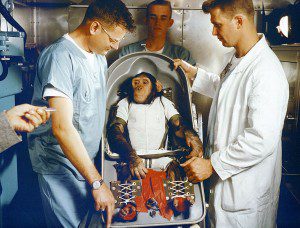

Dear Colleague,
We need your help to counter a serious threat to the humane use of animals in research. The Great Ape Protection and Cost Savings Act (S 810), which would prohibit the use of chimpanzees in medical research, may be voted on in the Senate this week (it was approved by a Senate committee in July)! Passage of this bill could have devastating consequences for ongoing research into human diseases such as hepatitis C, as well as studies benefiting the great apes themselves. Even if you do not work with great apes, you should be concerned about this bill because it would end research deemed by the Institute of Medicine (IOM) to be ethically sound and scientifically important and could pave the way for legislation to ban research with other species
Those who oppose the use of animals in research are making an aggressive effort to get this bill passed before Congress goes home for the year. We must let them know that chimpanzees are important animal models for research. Please take action now by going to http://capwiz.com/faseb/issues/alert/?alertid=62215781 to send an email to your Senators urging them to oppose the Great Ape Protection and Cost Savings Act.
You can find the text of this bill on this webpage (the pdf link at the top of the page provides the most readable version of the bill). Great apes include the chimpanzee, bonobo, gorilla, orangutan, and gibbon. Invasive research is any research that may cause death, injury, pain, distress, fear, or trauma.
According to the text of the bill, the chimpanzee is the only great ape used for invasive research in the United States, where there are approximately 1000 housed in laboratories.
The bill cites the Institute of Medicine and National Research Council report entitled €œChimpanzees in Biomedical and Behavioral Research: Assessing the Necessity€ which concluded that most current use of chimpanzees for biomedical research is unnecessary. It states that research on hepatitis C antiviral drugs, respiratory syncytial virus, future monoclonal antibody therapies, or a therapeutic hepatitis C virus vaccine, does not require chimpanzees, and that ‘the use of a combination of non-chimpanzee methods for the development of monoclonal antibody therapies may make research on the chimpanzee largely unnecessary; and non-chimpanzee models, if further improved, may reduce or obviate the need for the continued use of the chimpanzee for prophylactic hepatitis C vaccine research.’
Presumably the authors of the bill refer in part to work directed on developing a mouse model for HCV infection. However, as indicated by the bill’s language, it is not yet clear if these models will supplant the chimpanzee for HCV research.
The purpose of this act is to phase out invasive research on great apes and the use of Federal funding of that research, both in and outside of the United States. All existing chimpanzee protocols must be terminated within three years of passing of the bill, and once the bill has been passed, no new chimpanzee experiments may be started.
There is an escape clause – if, after three years have passed, it is determined that a new disease requires research on chimpanzees, the Great Ape Task Force will be created to evaluate that need.
If this act had been passed in the 1950s, it might not have been possible to develop poliovirus vaccines. While transgenic mice recapitulate much of poliovirus pathogenesis, they are not orally susceptible to infection (unless the interferon system is disabled) and therefore cannot reliably be used to test protection conferred by immunization.
It seems premature to pass an act banning research on chimpanzees. These animals are needed for testing anti-HCV therapies and vaccines, and as stated in the bill, it is not yet clear if other animal models will replace chimpanzees. It seems prudent to wait until we have a suitable animal model for HCV (and other infectious and non-infectious diseases which currently require chimpanzees) before outlawing the use of this animal in research.

Comments are closed.